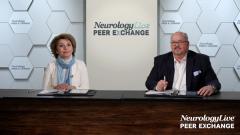
Postpartum Relapse in Patients With MS
Jeffrey Dunn, MD, and Regina Berkovich, MD, PhD, discuss rates of postpartum relapse in patients with multiple sclerosis and how they approach this topic with their patients.
Episodes in this series

Jeffrey Dunn, MD: There is an increase of postpartum relapse. It seems to increase slightly, as we’ve talked about. Although your experience has been favorable, is there any particular way you counsel your patients? Let’s say the scenario, in this case, is your patient comes in, she’s halfway through pregnancy, she’s doing well but she’s nervous, and she’s beginning to plan after the baby comes…. Are there certain bits of advice you make sure to give your patient so she’s prepared?
Regina Berkovich, MD, PhD: Definitely. First, I must say the cases that I remember well from my experience, postpartum relapse is, unfortunately, where those patients who rely on breastfeeding, thinking of protective properties of breastfeeding. I’m aware of certain publications indicating exquisite breastfeeding is better than partial breastfeeding, but I believe that in those studies, an important comparator group is missing, which would be those postpartum women who started on disease-modifying therapy [DMT]. Because that ultimately is a question: Can the breastfeeding be compared with the efficacy of DMT? Again, the baby is not my patient, although I wish that baby to be well, but I’m concerned about the mom. By being concerned about the mom, I provide the best service for the baby, because the baby needs the mom.
Jeffrey Dunn, MD: The baby’s health is the mom’s health. Let’s go back to that first point. Let’s say a group or cohort of breastfeeding women are looked at and you see that women who are breastfeeding have fewer multiple sclerosis attacks. So, you have 2 events happening: women are breastfeeding and women are having few attacks. When 2 things go together, it’s always difficult to establish causality. When 2 things are associated, you don’t know the direction of the causal arrow, so do you think the case can be made that breastfeeding favorably influences relapse rate? Is it the breastfeeding that’s decreasing relapse rate, or do you think it’s the women who are having fewer relapses that feel more comfortable to breastfeed? Maybe a combination of the 2? Do you have any sense of which direction the causal arrow faces?
Regina Berkovich, MD, PhD: We may never know, because the postpartum women are a protected population. You never expect to do clinical trials on that population, and therefore whatever hypothesis we come up with is just that. It’s just a hypothesis. I can only look into my experience from decades of treating multiple sclerosis, and I can tell you that those patients who restart on effective [DMT] after a couple weeks or 3 weeks of breastfeeding would have the best protection possible. It also means that before the pregnancy, that person should already be on established DMT, which makes it much easier to restart on treatment.
Transcript Edited for Clarity
Newsletter
Keep your finger on the pulse of neurology—subscribe to NeurologyLive for expert interviews, new data, and breakthrough treatment updates.











